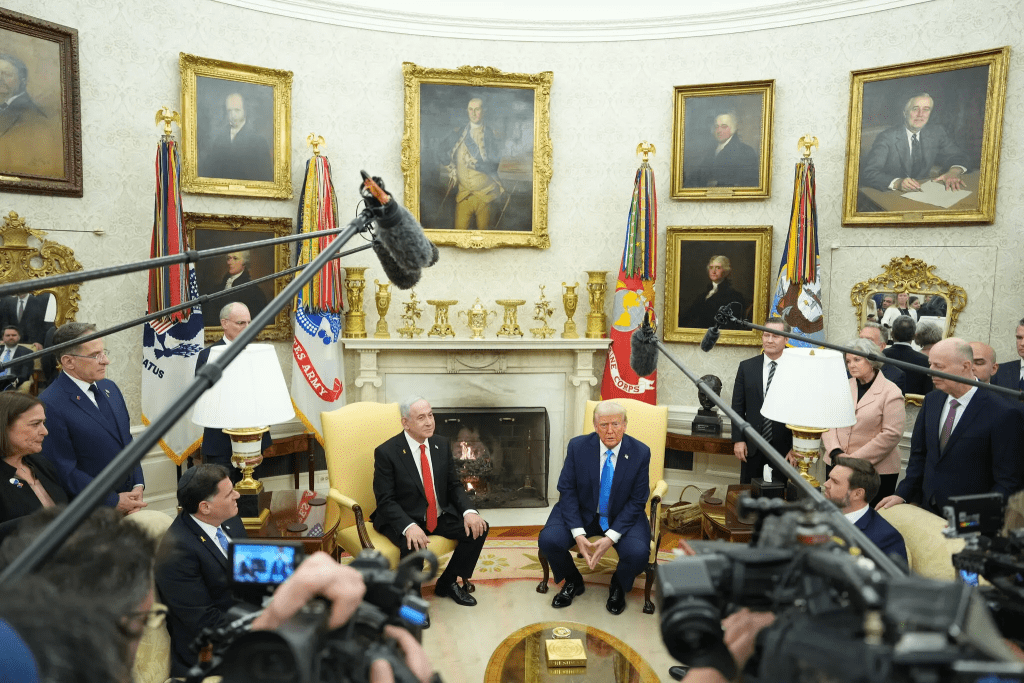Trump’s Gaza Proposal Sparks Global Controversy
Former U.S. President Donald Trump has once again ignited a firestorm of debate by proposing that the United States take over Gaza and permanently relocate its Palestinian population. This unprecedented suggestion came during a meeting with Israeli Prime Minister Benjamin Netanyahu at the White House. Trump’s vision, which he framed as both a humanitarian mission and an economic development opportunity, has left world leaders, international organizations, and political analysts stunned.

Trump’s Vision: A U.S.-Controlled Gaza
In a striking departure from traditional U.S. foreign policy, Trump suggested that America should assume control over the Gaza Strip. Speaking at a news conference, he stated, “The U.S. will take over the Gaza Strip, and we will do a job with it too. We’ll own it and be responsible for cleaning it up.” He further painted a picture of a transformed Gaza, reimagined as a booming economic hub—what he called “the Riviera of the Middle East.”
While Trump presented his idea as a means to stabilize the war-torn region, his proposal has been widely criticized as an overreach of U.S. power and a blatant disregard for international law. Forcibly displacing an entire population is considered a violation of human rights and international treaties, making his proposal one of the most controversial geopolitical moves in recent history.
A Shift in Trump’s Middle East Stance
Trump’s plan marks a stark reversal from his previous position on U.S. involvement in the Middle East. In his 2016 campaign, he vowed to pull America out of costly foreign conflicts, criticizing previous administrations for nation-building efforts. However, with this new proposition, he appears to be embracing an interventionist approach—one that reopens old wounds in the Israeli-Palestinian conflict.
Beyond the legal and ethical implications, Trump’s idea raises logistical questions. How would the U.S. take control of Gaza? Would military force be used? What happens to the millions of Palestinians who currently live there? These unanswered questions highlight the impracticality of the proposal, making it unlikely to gain traction in Washington or among America’s allies.
Mass Palestinian Relocation: A Geopolitical Powder Keg
Trump’s proposal goes beyond a mere takeover—he is calling for the permanent relocation of all Palestinians from Gaza to other Middle Eastern countries, such as Egypt and Jordan. He justified this by claiming that Gaza is “not a place for people to be living” due to the devastation left by Israel’s military campaign against Hamas following the October 7, 2023, attacks.
However, neither Egypt nor Jordan has expressed willingness to accept an influx of Palestinian refugees. Historically, both nations have rejected such ideas due to security concerns, demographic instability, and past conflicts involving Palestinian displacement. Trump’s insistence that they will change their minds reflects a fundamental misunderstanding of Middle Eastern geopolitics.
Hamas, which has governed Gaza for nearly two decades, outright rejected Trump’s proposal. A senior Hamas official labeled the idea as “a recipe for chaos and tension in the region.” Meanwhile, human rights organizations have condemned the plan as an attempt at ethnic cleansing, warning that forced displacement on such a scale would trigger further instability.
Netanyahu’s Response: A Calculated Endorsement
Israeli Prime Minister Benjamin Netanyahu, who has had a fluctuating relationship with Trump, appeared supportive of the proposal. During their meeting, he praised the former president’s boldness, stating, “You see things others refuse to see, and you say things others refuse to say.” His endorsement suggests that elements within Israel’s government may be open to radical solutions regarding Gaza, especially as the war with Hamas continues.
However, Netanyahu’s backing does not guarantee broad Israeli support. Many in Israel’s security establishment have expressed concerns about the long-term consequences of forcibly removing Palestinians from Gaza. Critics argue that such a move could spark a regional conflict, drawing in hostile actors and further isolating Israel on the world stage.

The Global Reaction: Outrage and Skepticism
Trump’s proposal has been met with widespread condemnation. The United Nations, European Union, and numerous Middle Eastern leaders have denounced the idea, calling it irresponsible and legally indefensible. The Geneva Conventions explicitly prohibit the forced transfer of populations, and legal experts argue that Trump’s plan would constitute a direct violation of international law.
Additionally, Trump has not cited any legal authority that would grant the U.S. the power to seize Gaza, raising concerns about how such a plan would be implemented. The Biden administration has remained largely silent on the proposal, likely to avoid legitimizing an idea that is so widely seen as unworkable.
Trump’s Real Estate Mindset: A Flawed Perspective
Trump’s comments on Gaza’s future reveal his real estate developer mindset, where land is simply a commodity to be repurposed. He suggested that Gaza could be rebuilt into a thriving economic zone, with funding from wealthy Gulf nations. However, his plan ignores the deep historical and emotional ties that Palestinians have to their homeland.
Comparing the resettlement of Palestinians to building a luxury real estate project fails to acknowledge the humanitarian crisis at hand. People are not just being asked to relocate; they are being stripped of their homes, history, and identity. Such a move would likely fuel resentment, radicalization, and further violence, rather than bringing the stability Trump envisions.
What’s Next? Will Trump’s Plan Gain Traction?
While Trump’s proposal is unlikely to be implemented, it does signal a dramatic shift in how he would approach Middle East policy if he were to return to office. His hardline stance on Gaza and his willingness to challenge international norms suggest a foreign policy approach centered on unpredictability and provocation.
For now, Trump’s idea remains a provocative statement rather than a tangible policy. However, if he gains further political influence, his aggressive approach toward Gaza and the Palestinian issue could reshape U.S. relations with Israel, Arab nations, and the broader international community.
Conclusion: A Dangerous Gamble with Global Consequences
Trump’s proposal to take over Gaza and relocate all Palestinians is one of the most radical geopolitical ideas proposed by a U.S. leader in modern history. While framed as a humanitarian and economic initiative, it is fraught with legal, ethical, and diplomatic challenges.
His plan faces near-universal rejection from the international community and risks destabilizing an already volatile region. As the world watches, the real question remains: Is Trump serious about this plan, or is this another bold statement designed to capture headlines?
Regardless of the answer, one thing is certain: this proposal has added yet another layer of complexity to an already tense Middle East crisis.